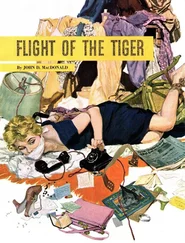“So?”
“Protective custody? She’ll have to make a statement anyway. She’s the link between Staniker and the kid. We’ve got to go through the routine of the murder one indictment anyway and...”
“I try to keep from telling you your end of the business, Bert.”
“Sorry about that.”
“So you want to bring her in. And you happily married and all that. Or maybe you collect autographs.”
“Well, I like to see Barney have a little fun on the job too, but I was thinking that if we have her before she knows who did what to who, and make it a long slow ride, and fake her out a little, there might be something we could make stick later on, because there will be all kinds of pressure we should do something about her. The exposure is going to heat up every weird and rapo in the files, and with a full moon coming up, the cronkies are going to line up three deep, breathing through their mouths anyplace they think she might show.”
After a silence, Lobwohl said, “All right, but we don’t know how much clout she might have, so go very, very easy.”
“We have this little roll of red carpet we carry, and...”
“Somehow, Kindler, when you make those little funnies I keep thinking of all the kicks Mercer and Tuck are having bringing the Akards in to make a positive on the only son they’re ever going to have. The kid was born and raised here and there is no j.d. record on him at all, so the mother is going to keep telling Mercer and Tuck that he was always a good boy.”
“I’m sorry, sir.”
“No apology necessary. I shouldn’t chew you. And by now I’ve been around long enough so I should stop bleeding.”
“When you do, it’s time to get into another line of work.”
“Before you unroll your little red carpet, the lady will be apprised of her right to have an attorney present while her statement is being taken, and she will be permitted to phone and arrange to have said attorney either meet her here or meet her at her house and drive in with her while you follow along.”
“So what do I tell her about why we’re bringing her in?”
“Hey! There’s no next of kin on Staniker. Central records hasn’t sent back a match on the prints yet.”
“Oh I like that! Duty of a citizen. Ex-employer, et cetera. Voluntary all the way. And a good jolt for her that ought to knock loose something useful — if there is anything. Meanwhile, maybe somebody could start backtracking her, develop a line to somebody who knew Fontaine well enough. And there’s a chance she lived in Atlanta. While we’re in the place I can let light-fingered Scheff see if he can pick up anything with a chance of enough prints on it to get a principal registration.”
“Pretty remote.”
“Let me get Harv to tell you how it worked a couple times where we knew a single print registration wouldn’t do us any good at all.”
Halfway along the shell road to the Harkinson place they met Raoul Kelly trudging toward the highway.
When they stopped, Raoul came over to the car, wearing a troubled frown.
“Kelly,” Barney Scheff said, “we’re taking the Harkinson woman in. With any luck we’ll keep her around awhile. And you maybe better clear your little gal out of there today instead of waiting until Wednesday. You got a car?”
“I left it parked down the highway, in a grove.”
“If nobody clouted the wheels and the engine, after we leave she should lock the place up and pack and leave with you, because if we scared her that bad, she’s going to get a lot worse time from the spooks who’ll come swarming around the place.”
“What’s the matter? What are you talking about?”
“When we were here before, we knew somebody faked Staniker for a suicide. Stuck him in a bath tub and cut his wrists. From what we got from you, it looked like Oliver might fit, and they found him floating around in his sailboat. After he fixed Staniker, he killed himself. The woman is the motive. You have no idea how miserable the newspaper guys and the rest of them can get when they get a sniff of a story like this. Those bastards will really shake up that Francisca. What you do, Kelly, you stash her someplace where they can’t get at her. Then if we have to get a statement or anything, we’ll keep it as quiet as we can. What we’ll do, we’ll get in touch with you if we need her. Where do you work?”
“On the Record .”
Bert Kindler said, “I hope to God you work around the presses or peddle ads.”
“Reporter. But I do features. Latin American politics. Foreign affairs. Stop looking at me like that. Look, you did me two favors. Both large. So I am going to run to a phone and get the city desk and yell they should stop the presses. Scoop. Gimme rewrite. Here’s my card. Home address.”
“And,” said Scheff, “when they start beating the bushes looking for Francisca Whosis, everybody knows she’s Kelly’s girl. So you can make a very fine deal for an exclusive maybe?”
“I won’t have any idea where she is.”
After a long thoughtful stare, Scheff said, “Let’s buy it, Bert. But if he leaves us with any egg on the face, all we have to do is tell his boss what kind of a piece of news his boy sat on. Let’s go get Crissy-wissy and take her bye-bye.”
Barney Scheff had spent four years of his professional life on the Miami Beach force. He had worked the big hotels along Collins, called in by the house detectives and protection agencies to work upon every form of bunco the guile of man and woman has been able to invent.
When Mrs. Harkinson met them at the door and let them in, he knew at once that he was in the presence of class merchandise. He had seen hundreds of them. The ones this good were usually celebrity imports, lined up for a full season by somebody with the scratch to pay the exclusive freight. Ten, twelve years ago that was the way she would be making it. Mink to the floor, glittering at ears, throat and wrist and fingers, swaying on the tall heels with the hair piled high, moving in the clubs and the show bars at the side of some little fat guy with his head tanned dark brown all over from playing poolside gin for high stakes. The small men wore the big young blondes with the same pebble-eyed indifference with which an iron curtain diplomat might treat the aides who follow a pace behind him.
Such women were one of the necessary outward manifestations of that special kind of coarse and curious money which accumulates in the lock boxes of casino owners, union officials, dealers in casino properties, in the raw products of addiction, in oil tankers, night clubs, prize fighters, television properties — in all the more or less legal services and products which, if a man were greedy enough and ruthless enough, could provide a way of channeling off cash without leaving any trace in the official books and records.
So they kept the tall blonde for that season or that place in tow, at the Beach, or Vegas, or Palm Springs, or London, or Acapulco, or Puerto Rico. She sat in the box at the track, a stick of tickets in her fist, squealing the smart money horse home. She leaned forward at ringside, face avid, cawing for blood. And in the night in the hundred and fifty a day suite, under lights turned low, while the cigar end smouldered and stank in the bedstand ashtray, she earned her keep in effortful requested ways. She would not get too drunk, or get quarrelsome, or make demands, or steal through the darkness to thin the pad of bills in the platinum clip, or give any wolf anything but immediate frost, not the smart ones. She would be a fun kid, because it was a smallish world and everybody knew everybody sooner or later. If you got labeled trouble, if you got too cute, the easiest fate would be no phone call from the next friend of a friend, no more first-class jets, no more silk sheets, no more thirty-dollar Chateaubriand for two. Or it could be a cancellation with a little more to remember if the friend of a friend was in one of the tough trades. Barney Scheff remembered taking one in who’d had her teeth uncapped with a pair of pliers. Between faints she was hysterical, yet not crazy enough to tell who’d done it.
Читать дальше






![Джон Макдональд - Wine of the Dreamers [= Planet of the Dreamers]](/books/430039/dzhon-makdonald-wine-of-the-dreamers-planet-of-thumb.webp)




![Джон Макдональд - The Hunted [Short Story]](/books/433679/dzhon-makdonald-the-hunted-short-story-thumb.webp)
